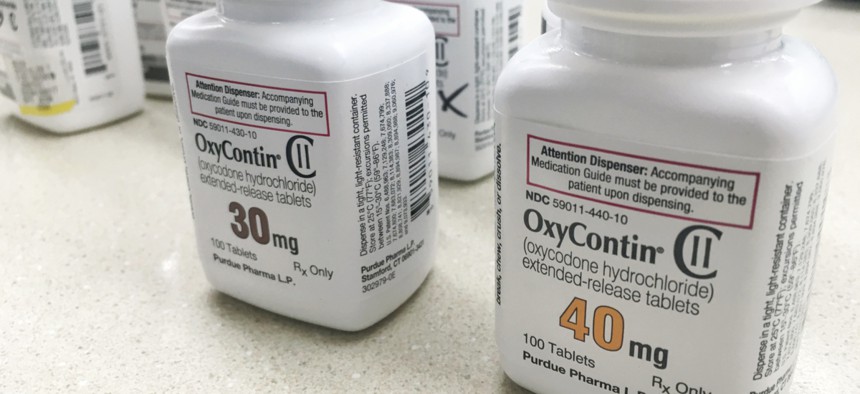States Claim Drugmaker Owes $2 Trillion for Role in Opioid Epidemic

OxyContin is a prescription opioid made by Purdue Pharma. Shutterstock
Forty-nine states and the District of Columbia say that OxyContin maker Purdue Pharma contributed to a crisis that has claimed hundreds of thousands of lives.
Purdue Pharma, maker of the prescription opioid OxyContin, owes states $2.15 trillion to address its alleged role in fueling America’s opioid epidemic, according to attorneys general in 49 states, Washington, D.C., and several U.S. territories.
In new filings made public as part of Purdue’s bankruptcy proceedings, the states accuse the drugmaker of aggressively marketing highly addictive painkillers to doctors and patients while downplaying the risks they posed. These actions, the states claim, contributed to the more than 200,000 opioid overdoses that occurred between 1999 and 2016.
The filings estimate that the opioid epidemic has cost state governments $630 billion since 2007 in costs for health care for state employees and Medicaid recipients, for addiction prevention efforts, and for justice system responses to the epidemic. These costs and others are expected to grow to $2.15 trillion over the next 20 years as future opioid abatement efforts are planned.
Purdue, which is owned by the billionaire Sackler family, filed for bankruptcy in September 2019. The company offered between $10 and $12 billion to settle the more than 2,000 lawsuits filed against it by state, local and tribal governments. As part of that settlement, the Sacklers would contribute $3 billion and relinquish control of Purdue, turning the company into a public benefit trust.
The settlement amount was not well-received by several attorneys general, who said that they wanted to see the Sacklers contribute more money. In December of 2019, an audit of the company’s finances revealed that members of the Sackler family withdrew more than $10 billion from Purdue to put in family trusts as the opioid crisis ballooned and scrutiny of Purdue’s practices intensified.
When the settlement was first proposed, New York Attorney General Letitia James said she would “continue fighting to make [the Sackler] family pay for the death and destruction they inflicted on the American people.” Later in the year, she reiterated that she would not allow “bankruptcy to shield Purdue or its owners from being held accountable for its misconduct.”
States had until the end of July 2020 to make claims as part of Purdue’s bankruptcy proceedings. They asked for sums far higher than what was proposed by Purdue last September. New York’s claim alone totaled more than $165 billion, and California claimed $192 billion. The only state not to make a claim was Oklahoma, which settled individually with Purdue for $270 million in March of last year.
Purdue said it will continue to try to build enthusiasm for the settlement proposed last year. "The proposed settlement would deliver more than $10 billion in value, including 100% of Purdue's assets, to claimants and communities, and would address the opioid crisis by providing needed funds, as well as millions of doses of lifesaving opioid addiction treatment and overdose reversal medicines," company spokesperson Michele Sharp said in a statement.
In another opioid-related lawsuit filed this week, West Virginia's attorney general alleged that Walmart and CVS bear responsibility for the epidemic in the state. Attorney General Patrick Morrisey, a Republican, said the two companies regularly filled suspiciously large or frequent orders for opioids, "reap[ing] billions of dollars in revenues while causing immense harm to the state of West Virginia and its residents.”
“We must hold everyone accountable for the roles they played in the opioid epidemic and continue to push toward solutions that go after the root cause of the problem,” Morrisey said in a statement.
In response, CVS said that the suit is “misguided” because “opioids are made and marketed by drug manufacturers, not pharmacies.”
Other state-led opioid cases delayed by court shutdowns that happened as a result of the coronavirus pandemic also resumed in recent days.
Emma Coleman is the assistant editor for Route Fifty.
NEXT STORY: Getting a Flu Shot This Year is More Important Than Ever Because of COVID-19






